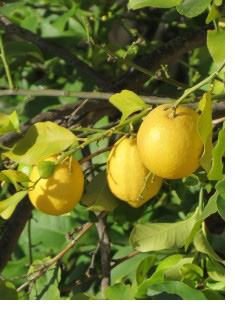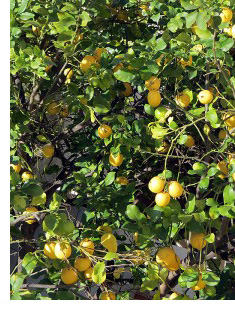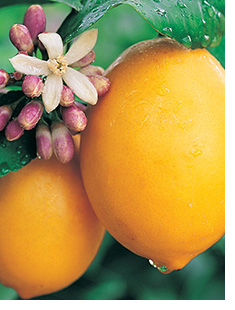Lemons in London!

I am a naughty gardener.
I have been gallivanting again, this time in spring when no self-respecting grower ever strays more than five feet from the garden gate. I abandoned a whole greenhouse full of just-emerged seedlings and a half-planted veg garden for a whole week. I know, I know. You can’t make me feel more guilty than I feel already.
But I’m not sorry: because otherwise I’d have missed seeing the most magnificent lemon tree I’ve ever seen growing beneath my bedroom window in Sicily. It was easily the largest; the size of a medium-sized apple tree here, and it was in full fruit.
Lemons and Sicily have a long, profitable and occasionally troubled history. They’ve been grown there for 1000 years, and nine out of ten Italian lemons are grown on the island. Rumour has it that the Cosa Nostra was formed after a quarrel about a lemon grove. Bet they didn’t put that in The Godfather. Plus it was Sicilian lemon growers who invented possibly my favourite saying of all time: ‘When fate hands you a lemon, make lemonade’.
 They’re not farmed as much as oranges where I was, near Catania in the south-east of the island: that happens mostly on the volcanic lower slopes of Etna, near Messina in the north-east. But there’s a lemon tree in most people’s gardens. It’s my idea of a fantasy fruit tree: evergreen, and frothing with starry white blossom that fills the air with a sweet perfume in November and December, of all months. The fruits are of course that wonderful daffodil shade of cheerfulness from about January, when nothing else is stirring let alone producing so vibrant a splash of colour. They take a year to ripen, so you’re picking them as the next blossoms arrive.
They’re not farmed as much as oranges where I was, near Catania in the south-east of the island: that happens mostly on the volcanic lower slopes of Etna, near Messina in the north-east. But there’s a lemon tree in most people’s gardens. It’s my idea of a fantasy fruit tree: evergreen, and frothing with starry white blossom that fills the air with a sweet perfume in November and December, of all months. The fruits are of course that wonderful daffodil shade of cheerfulness from about January, when nothing else is stirring let alone producing so vibrant a splash of colour. They take a year to ripen, so you’re picking them as the next blossoms arrive.
Lemons aren’t just for Sicily though. They’ll do that winter flowering and fruiting thing here, too.You could have a go at growing a lemon in the ground if you live in an inner city microclimate, in London, say. Even I could have had a stab at it this winter, since temperatures haven’t once dipped below zero. But mostly, you’ll have to resign yourself to growing your lemons in a container and grit your teeth for a lot of heavy lifting, as lemon trees can’t stand anything below 5°C and you’ll need to bring it under cover in winter. This doesn’t necessarily mean indoors: in fact citrus tend to prefer staying as close to outdoors as possible – in a frost-free greenhouse, say.
Growing in a pot has a rather bonsai effect, so your lemon tree won’t reach much more than a couple of metres tall, but it likes spending the summer outdoors so sink it into the ground to the rim of the pot and no-one will know the difference. If you wait for the very sunny day that constitutes the British summer, then squint and crouch down a bit you might even be able to kid yourself it’s a bit Sicily-ish.
 Don’t overwater in winter; keep feeding with those funny little upside-down citrus feed thingies you get in the garden centre; and never move them from indoors to outdoors, or vice versa, too suddenly or they’ll drop their leaves. A gradual transition, leaving them out a little longer each day over a period of two weeks or so, keeps them green and healthy.
Don’t overwater in winter; keep feeding with those funny little upside-down citrus feed thingies you get in the garden centre; and never move them from indoors to outdoors, or vice versa, too suddenly or they’ll drop their leaves. A gradual transition, leaving them out a little longer each day over a period of two weeks or so, keeps them green and healthy.
Eventually, when your lemon tree grows big enough, a waft of sweet perfume will greet you as you open the greenhouse door one chilly November. It’s such a delicious scent you will start finding urgent winter tasks in the greenhouse just so you can breathe it in again.
A year later and you’re celebrating Shrove Tuesday with unusual dedication as the lemons you squeeze on your pancakes are miraculously home-grown and have only just been plucked from the tree. And you’ll never need to leave your garden in early spring again, as you’ll have brought a taste of Sicily right into your kitchen.




 They’re not farmed as much as oranges where I was, near Catania in the south-east of the island: that happens mostly on the volcanic lower slopes of Etna, near Messina in the north-east. But there’s a
They’re not farmed as much as oranges where I was, near Catania in the south-east of the island: that happens mostly on the volcanic lower slopes of Etna, near Messina in the north-east. But there’s a  Don’t overwater in winter; keep feeding with those funny little upside-down
Don’t overwater in winter; keep feeding with those funny little upside-down 